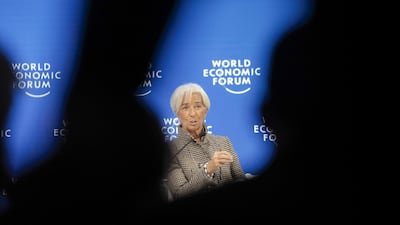The last week has been dominated by Davos, downgraded global growth forecasts and Brexit, but at the end of it there was good news as the US government shutdown came to an end.
The market was already enjoying the possibility that the Fed might end its balance sheet tightening sooner than expected, so the news of an end to President’s Trump’s government closure will likely lift sentiment further at the start of this week.
Last week got off to a rough start, however, with the IMF downgrading its forecast for global growth this year, in the latest update to its World Economic Outlook (WEO). The Fund now expects global growth of 3.5 per cent in 2019, down by 0.2 percentage points since the October WEO.
The revisions were lower across both developed (mainly Europe) and emerging markets. While this is still a solid growth rate, albeit the slowest in three years, the IMF cited a significant rise in downside risks, including increased trade tensions, tighter financial conditions, Brexit, and a prolonged US government shutdown. The Mena growth forecast was also revised down by 0.3 percentage points to 2.4 per cent in 2019, with the Saudi Arabia gross domestic product forecast cut to 1.8 per cent from 2.4 per cent previously.
This followed on from similar downward revisions from the Organisation for Economic Co-operation and Development and the World Bank and news that China's economy grew 6.4 per cent year-on-year in the fourth quarter of 2018. This was the slowest growth rate since the financial crisis, setting the stage somewhat auspiciously for a Davos World Economic Forum with the theme of 'globalisation'.
Not surprisingly the mood of the event was said to be muted, with prominent global leaders missing and key issues avoided. Politics has changed so much in the last few years that US Secretary of State Mike Pompeo was able to chide the event over a video link for not keeping up with that change.
And in the background the soundtrack remained resolutely gloomy. German investors’ assessment of current economic conditions deteriorated sharply in January, with the ZEW current situation index - an indicator of economic sentiment - falling to 27.6 from 45.3 in December.
Germany’s Ifo Business Climate Index for January also fell to the lowest level since February 2016, while the German PMI manufacturing index hit a 50-month low, providing further evidence that economic growth in the eurozone’s largest economy has stalled. Japan’s PMI manufacturing index also fell to 50 in January from 52.6, ending the longest expansionary run in a decade and new export orders fell at the sharpest rate since July 2016.
Against all of this the European Central Bank had no choice than to drop its earlier optimism that the risks were ‘broadly balanced’, with ECB president Mario Draghi now acknowledging that incoming data has been weaker than expected and that risks are to the downside
Luckily there was one bright spot at the end of the week with news that the US government was to be reopened. Although President Trump has only agreed to a temporary funding of government until mid-February, it is unlikely that the shutdown will resume, as the President has dropped his insistence that full border wall funding must be included. First quarter growth fears in the US are now likely to abate, allowing forecasters to start revising up their estimates. The markets were already enjoying rumours that the Fed was considering an early end to its balance sheet reduction programme, with the Wall Street Journal reporting that with the rate policy on hold for now the topic could be more actively discussed at this week's Federal Open Market Committee meeting. So, the news of a breakthrough on this other thorny issue is likely to be welcomed in the coming week.
It is unlikely that the other major intractable issue impacting markets, Brexit, will find such a timely resolution. Theresa May’s Plan B is due to be voted on by Parliament in the coming week and is unlikely to pass. However, amendments to the bill have the potential to kick the Brexit ‘can’ further down the road and beyond the March 29 Article 50 deadline if a deal has not been agreed by the end of next month. In the context of the whole Brexit saga to date, a delay may be the best thing that markets can hope for at this point.
Tim Fox is chief economist and head of research at Emirates NBD


